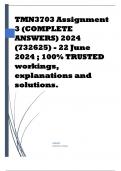TMN3703 Assignment
3 (COMPLETE
ANSWERS) 2024
(732625) - 22 June
2024 ; 100% TRUSTED
workings,
explanations and
solutions.
ADMIN
[COMPANY NAME]
,Question 1 Discuss The Factors You Would Consider When
Setting An Assessment Task For Grade 5 Life Skills Learners.
[20]
When setting an assessment task for Grade 5 Life Skills learners,
various factors must be considered to ensure the task is
developmentally appropriate, engaging, and effectively measures
the intended learning outcomes. Here are the key factors to
consider:
1. Curriculum Alignment
• Learning Objectives: Ensure the assessment aligns with the
curriculum's learning objectives and outcomes for Grade 5
Life Skills.
• Content Coverage: The task should cover the specific topics
and skills outlined in the curriculum, such as social skills,
personal development, and health education.
2. Developmental Appropriateness
• Cognitive Level: Tasks should match the cognitive abilities
of 10-11-year-olds, incorporating concrete thinking with
some abstract thinking abilities.
• Emotional and Social Development: Consider the
emotional and social maturity of the learners. Tasks should
foster self-awareness, empathy, and teamwork.
3. Engagement and Motivation
• Interest and Relevance: Design tasks that are interesting
and relevant to the students’ lives. Use real-life scenarios
they can relate to.
, • Variety of Activities: Incorporate different types of
activities to cater to diverse interests and learning styles, such
as group projects, role-playing, or creative assignments.
4. Diverse Learning Styles
• Multiple Intelligences: Recognize and cater to various types
of intelligences, including linguistic, logical-mathematical,
spatial, bodily-kinesthetic, musical, interpersonal,
intrapersonal, and naturalistic.
• Learning Modalities: Include visual, auditory, and
kinesthetic elements to engage all learners effectively.
5. Inclusivity and Differentiation
• Accessibility: Ensure the task is accessible to all students,
including those with learning disabilities or English as a
second language.
• Differentiation: Provide different levels of difficulty or
different types of support to cater to students with varying
abilities.
6. Assessment Methods
• Formative and Summative Assessment: Use a mix of
formative assessments (e.g., observations, quizzes) and
summative assessments (e.g., final projects, tests) to get a
comprehensive understanding of student learning.
• Authentic Assessment: Design tasks that assess students'
ability to apply skills in real-world contexts, such as
community projects or simulations.
7. Clear Instructions and Expectations





